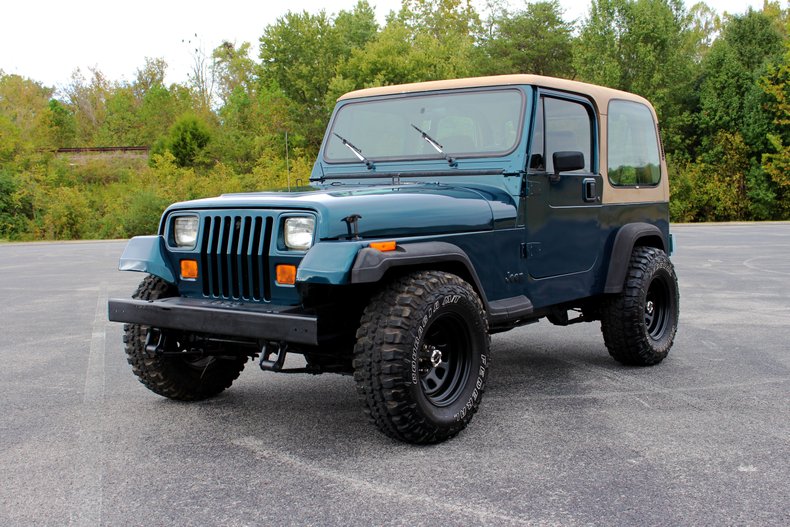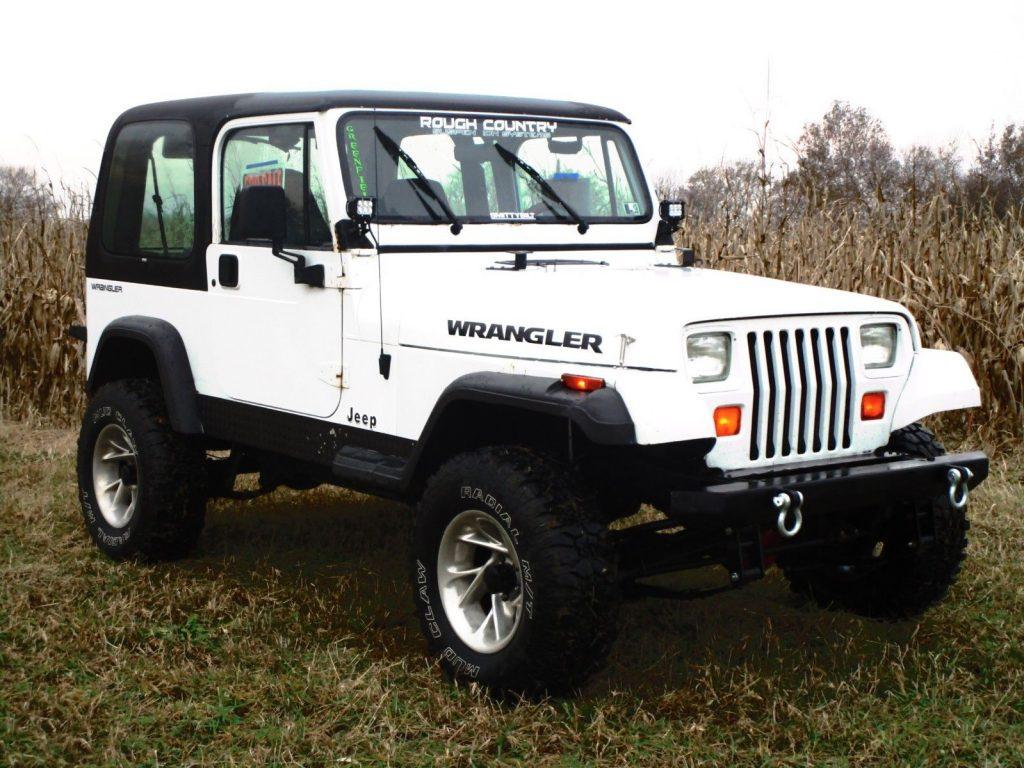1995 Jeep Wrangler Yj For Sale – The ease and convenience of online sales have created a global marketplace where individuals can connect with buyers and sellers across the world. On the other hand, buyers may seek to negotiate lower terms based on the findings from their due diligence or their assessment of the business’s future potential. One common concern is the risk of purchasing items that are damaged or not as described. The sale agreement will include details about the purchase price, payment terms, assets being transferred, and any contingencies that may apply. The sale process itself can be lengthy and involves multiple stages. Both buyers and sellers should approach transactions with honesty and transparency to ensure a smooth exchange. For some, selling a business is a proactive decision to move on to new ventures, while for others, the sale might be the result of external factors, such as market downturns, changing consumer preferences, or regulatory shifts. Business brokers play a key role in facilitating the transaction by acting as intermediaries between the buyer and seller. The concept of a circular economy, where products are reused and repurposed instead of discarded, is central to the appeal of second-hand goods. These platforms have also made it easier for individuals to sell their own pre-owned goods, turning unused or unwanted items into cash. They also often help with legal and financial aspects, ensuring that the transaction is completed smoothly and efficiently. Many quality goods are made by artisans or small businesses who take the time to create products that reflect their expertise and passion. The ability to share knowledge, ideas, and resources has empowered individuals in ways that were previously unimaginable. The production of new goods often requires significant resources, such as raw materials, energy, and labor, while also generating waste and contributing to pollution. A house can be bought, a car can be sold, a watch can be pawned. With just a few clicks, consumers can browse through thousands of listings for second-hand items from all over the world. For sellers, the challenge lies in pricing items fairly and accurately representing their condition. Used bookstores, both physical and online, offer an extensive selection of pre-owned books, from contemporary novels to classic literature. The idea of being “for sale” also touches on larger cultural and societal themes. They remind us that, despite living in a world where everything is for sale, there are some things that remain priceless.

Used 1995 Jeep Wrangler Sahara For Sale (Special Pricing) Select
Cars for saleused carscars for sale by ownernew cars

1995 Jeep Wrangler YJ for sale 64392 MCG
Cars for saleused carscars for sale by ownernew cars

1995 Yj Jeep Wrangler
Cars for saleused carscars for sale by ownernew cars

1995 Jeep Wrangler YJ for sale
Cars for saleused carscars for sale by ownernew cars

1995 Jeep Wrangler YJ SE
Cars for saleused carscars for sale by ownernew cars

Used 1995 Jeep Wrangler S For Sale (10,995) Select Jeeps Inc. Stock
Cars for saleused carscars for sale by ownernew cars

1995 Jeep Wrangler YJ 4×4 4 Cylinder Five Speed 99K Miles 1 Owner Clean
Cars for saleused carscars for sale by ownernew cars

Used 1995 Jeep Wrangler For Sale (10,995) Select Jeeps Inc. Stock
Cars for saleused carscars for sale by ownernew cars

1995 Jeep Wrangler YJ for sale
Cars for saleused carscars for sale by ownernew cars

1995 Jeep Wrangler YJ for sale
Cars for saleused carscars for sale by ownernew cars
Historically, many products were made by local craftsmen, and there was a direct relationship between the creator and the consumer. It doesn’t fall apart after a few uses, nor does it need to be replaced after a season. An item’s worth can be subjective, influenced by the desires, needs, and circumstances of both the seller and the buyer. For sellers, online platforms can expand their reach to a global audience of potential buyers, increasing the chances of finding the right match for their business. The environmental benefits of buying second-hand goods go beyond just reducing the need for new production. The idea that everything is for sale works to perpetuate inequality, as those with the most resources can continue to amass power and wealth, while others are left to scramble for what little they can get. For sellers, online platforms provide a global marketplace, allowing them to reach a wider audience than they would through traditional brick-and-mortar stores. Both the buyer and the seller are seeking the best possible terms, and finding common ground can be a challenge. Negotiation is often the most delicate part of the sale process. Whether it’s vintage clothing, antique furniture, or used luxury watches, second-hand goods offer an opportunity for buyers to find quality items that are no longer available in stores. For example, someone might be able to purchase a used smartphone or laptop with the same features and specifications as a brand-new model, but at a significantly reduced price. When consumers buy these goods, they are investing in both the product and the people behind it. Perhaps the most troubling aspect of the idea that everything is for sale is how it can shape the way we view the world and each other. Thrift stores, estate sales, and online marketplaces are excellent places to find second-hand furniture, with options ranging from antique and vintage pieces to more contemporary items. This shift in mindset has contributed to a growing acceptance and even celebration of second-hand shopping, making it a mainstream activity that is not just about saving money but about making more thoughtful and responsible choices. When someone talks about purchasing quality goods, they are likely thinking of items that have been designed to last, to provide a superior experience, and to offer a sense of value far beyond the initial cost. The world of second-hand goods for sale is vast and varied, encompassing everything from clothing, electronics, and furniture, to books, antiques, and collectibles. The concept of quality, however, is not a one-size-fits-all. Selling such an item can be a difficult decision, yet it often represents the practical need to downsize or make space for something new. Whether you’re the seller or the buyer, the phrase “for sale” is a reminder that everything in life is in constant motion, always moving toward something new, something different, something better.
In a circular economy, items are kept in use for as long as possible, reducing the need for new resources and minimizing environmental harm. There are communities that exist outside the realm of traditional commerce, where sharing, collaboration, and mutual support take precedence over profit. The world may increasingly operate under the assumption that everything is for sale, but the human spirit, with its capacity for love, creativity, and compassion, refuses to be bought. The notion suggests a world where anything and everything, regardless of its intrinsic value, can be bought, sold, or traded. In addition to offering unique items and affordable prices, many second-hand stores also serve an important social and community function. A piece of art, for example, may be valued differently by various individuals based on personal taste, financial resources, or the emotional connection they feel to the work. For sellers, this creates an opportunity to declutter their homes and make some extra money, while buyers have access to a vast marketplace of affordable, unique, and sustainable products. For instance, businesses in industries such as technology, renewable energy, or e-commerce may attract more buyers due to their perceived growth potential. Upcycling is a great way to make the most out of second-hand goods, adding both value and meaning to the items that are being repurposed. It is also important to check the seller’s reputation and read reviews or feedback from previous buyers. However, there’s also an argument to be made that, over time, quality goods are often more economical in the long run. Even in a marketplace where everything is commodified, there is still room for those moments and experiences that transcend value. The materials, labor, and expertise that go into crafting these items naturally make them more expensive. The world of second-hand shopping has also made quality goods more accessible. Are there things that should be kept beyond the realm of trade? Or has the marketplace — with its insatiable demand and promise of exchange — seeped into every facet of our being?
If everything is for sale, then the concept of value itself becomes fluid, subjective, and often manipulated. Unlike mass-produced items that may become outdated or fall apart with minimal use, quality products are designed to endure. When you look at something marked as “for sale,” you’re not only seeing an item; you’re seeing the possibility of a change, whether it’s the beginning of a new ownership, the end of a relationship with an object, or simply the result of a decision to move forward. This shift from a linear economy, where products are made, used, and disposed of, to a circular one, where products are continually reused and repurposed, is a step towards a more sustainable and environmentally friendly world. These acts of generosity remind us that there are still things in life that cannot be bought, cannot be sold, and cannot be quantified. The materials used, whether it’s hardwood, durable fabrics, or premium upholstery, are chosen for their longevity and aesthetic appeal.